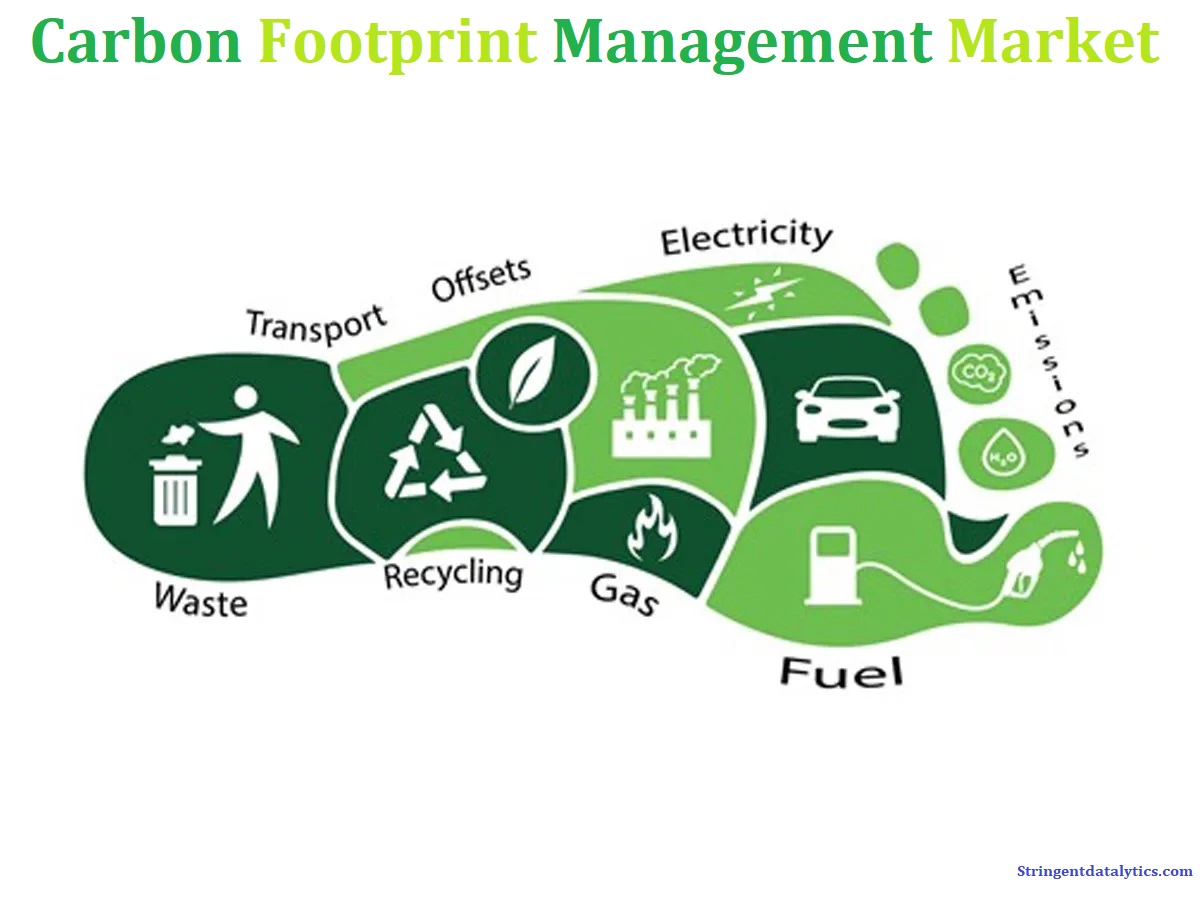
Carbon Footprint Management Market was valued at USD 10.3 billion in 2023, and is projected to reach USD 19.67billion by 2033, growing at a CAGR of 7% from 2024 to 2033.
Market Definition:
This market encompasses the tools, services, and strategies that organizations use to measure, analyze, and reduce their carbon footprint. A carbon footprint refers to the total greenhouse gas (GHG) emissions caused by an individual, organization, event, or product throughout its lifecycle.
In today’s environmentally conscious world, businesses are increasingly adopting strategies to minimize their carbon footprint. As sustainability becomes a focal point, the Carbon Footprint Management market is witnessing significant growth. From innovative technologies to strategic consulting, companies are embracing various solutions to manage and reduce their environmental impact.
Understanding Carbon Footprint Management
Carbon Footprint Management encompasses a range of practices aimed at quantifying and mitigating greenhouse gas emissions produced by organizations. These emissions primarily stem from activities such as energy consumption, transportation, waste generation, and manufacturing processes. By measuring and analyzing these emissions, businesses can identify areas for improvement and implement strategies to reduce their carbon footprint.
Key Components of Carbon Footprint Management
- Emission Tracking and Reporting: Carbon footprint management begins with accurately measuring emissions across all operational facets. Advanced software solutions facilitate real-time monitoring and reporting, enabling organizations to track their environmental performance effectively.
- Carbon Offsetting: In instances where emissions cannot be entirely eliminated, carbon offsetting provides a viable solution. Companies invest in projects that reduce or capture greenhouse gas emissions, effectively balancing out their own environmental impact.
- Energy Efficiency Initiatives: Improving energy efficiency is a cornerstone of carbon footprint reduction. Businesses deploy a range of measures, such as upgrading infrastructure, optimizing processes, and adopting renewable energy sources, to minimize energy consumption and associated emissions.
- Supply Chain Optimization: Many companies are now focusing on assessing and mitigating the carbon footprint of their supply chains. This involves collaborating with suppliers to implement sustainable practices and sourcing materials from environmentally responsible sources.
- Stakeholder Engagement: Engaging stakeholders, including employees, investors, and customers, is crucial for successful carbon footprint management. By fostering a culture of sustainability and transparency, organizations can garner support for their environmental initiatives.
The Growing Demand for Carbon Footprint Management Solutions
With increasing regulatory pressures, shifting consumer preferences, and the imperative to mitigate climate change, the demand for carbon footprint management solutions is on the rise. Businesses across industries recognize the importance of environmental stewardship not only for compliance but also for enhancing brand reputation and long-term viability.v
Receive the FREE Sample Report of Carbon Footprint Management Market Research Insights @ https://stringentdatalytics.com/sample-request/carbon-footprint-management-market/13386/
Market Segmentations:
Global Carbon Footprint Management Market: By Company
• Carbon Footprint Ltd
• Dakota Software Corporation
• ENGIE
• IsoMetrix
• ibm corporation
• ProcessMAP
• Schneider Electric
• SAP
• Wolters Kluwer N.V.
Global Carbon Footprint Management Market: By Component
• Solution
• Service
Global Carbon Footprint Management Market: By Industry Vertical
• Energy and Utilities
• Manufacturing
• Residential and Commercial Buildings
• Transportation and Logistics
• IT and Telecom
Regional Analysis of Global Carbon Footprint Management Market
All the regional segmentation has been studied based on recent and future trends, and the market is forecasted throughout the prediction period. The countries covered in the regional analysis of the Global Carbon Footprint Management market report are U.S., Canada, and Mexico in North America, Germany, France, U.K., Russia, Italy, Spain, Turkey, Netherlands, Switzerland, Belgium, and Rest of Europe in Europe, Singapore, Malaysia, Australia, Thailand, Indonesia, Philippines, China, Japan, India, South Korea, Rest of Asia-Pacific (APAC) in the Asia-Pacific (APAC), Saudi Arabia, U.A.E, South Africa, Egypt, Israel, Rest of Middle East and Africa (MEA) as a part of Middle East and Africa (MEA), and Argentina, Brazil, and Rest of South America as part of South America.
Click to Purchase Carbon Footprint Management Market Research Report @ https://stringentdatalytics.com/purchase/carbon-footprint-management-market/13386/?license=single
FAQs about Carbon Footprint Management
Q1. Why is Carbon Footprint Management important for businesses? A1. Carbon Footprint Management helps businesses reduce their environmental impact, comply with regulations, enhance their brand image, and improve operational efficiency.
Q2. How can companies measure their carbon footprint? A2. Companies can measure their carbon footprint using specialized software tools that track emissions from various sources, including energy consumption, transportation, and waste generation.
Q3. What are the benefits of carbon offsetting? A3. Carbon offsetting allows companies to compensate for their unavoidable emissions by investing in projects that reduce greenhouse gas emissions elsewhere, thus achieving a net-zero carbon footprint.
Q4. How can businesses encourage employee participation in carbon footprint reduction efforts? A4. Businesses can promote employee participation through awareness campaigns, training programs, incentivization schemes, and incorporating sustainability goals into performance evaluations.
Q5. What role does technology play in carbon footprint management? A5. Technology plays a crucial role by providing tools for emission tracking, data analysis, energy management, and automation, enabling businesses to streamline their carbon footprint management efforts.
Conclusion
As businesses navigate an increasingly complex landscape of environmental challenges and regulatory requirements, carbon footprint management emerges as a strategic imperative. By embracing innovative solutions, engaging stakeholders, and committing to sustainability, organizations can not only reduce their environmental impact but also drive long-term value creation and resilience. In this era of heightened environmental consciousness, proactive carbon footprint management is not just a choice but a business necessity.
About Stringent Datalytics
Stringent Datalytics offers both custom and syndicated market research reports. Custom market research reports are tailored to a specific client’s needs and requirements. These reports provide unique insights into a particular industry or market segment and can help businesses make informed decisions about their strategies and operations.
Syndicated market research reports, on the other hand, are pre-existing reports that are available for purchase by multiple clients. These reports are often produced on a regular basis, such as annually or quarterly, and cover a broad range of industries and market segments. Syndicated reports provide clients with insights into industry trends, market sizes, and competitive landscapes. By offering both custom and syndicated reports, Stringent Datalytics can provide clients with a range of market research solutions that can be customized to their specific needs.
Reach US
Stringent Datalytics
+1 346 666 6655
Social Channels:




Leave a Reply